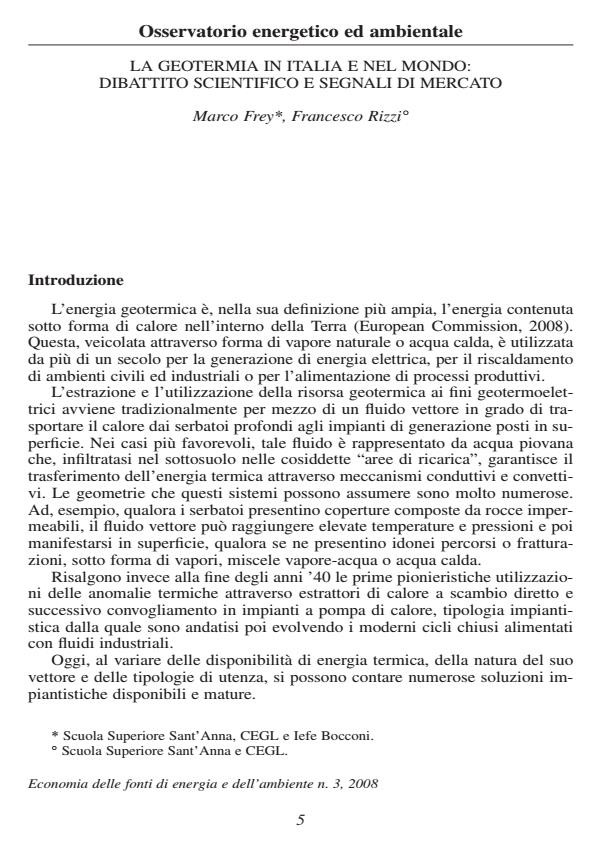La geotermia in Italia e nel mondo: dibattito scientifico e segnali di mercato
Titolo Rivista ECONOMIA DELLE FONTI DI ENERGIA E DELL’AMBIENTE
Autori/Curatori Marco Frey, Francesco Rizzi
Anno di pubblicazione 2009 Fascicolo 2008/3 Lingua Italiano
Numero pagine 14 P. 5-18 Dimensione file 907 KB
DOI 10.3280/EFE2008-003001
Il DOI è il codice a barre della proprietà intellettuale: per saperne di più
clicca qui
Qui sotto puoi vedere in anteprima la prima pagina di questo articolo.
Se questo articolo ti interessa, lo puoi acquistare (e scaricare in formato pdf) seguendo le facili indicazioni per acquistare il download credit. Acquista Download Credits per scaricare questo Articolo in formato PDF

FrancoAngeli è membro della Publishers International Linking Association, Inc (PILA)associazione indipendente e non profit per facilitare (attraverso i servizi tecnologici implementati da CrossRef.org) l’accesso degli studiosi ai contenuti digitali nelle pubblicazioni professionali e scientifiche
Geothermal resources in Italy and world-wide: scientific debate and market evolution - This paper describes the state of the art in development and utilization of geothermal resources in Italy and Tuscany. Departing from the geological peculiarities of this region, which have contributed to Italy’s leading role in technological innovation since the beginning of geothermoelectric power generation (GPG), recent evidences from the market and scientific community are here analyzed in order to answer the question whether the economic downturn will put geothermal energy on the back burner, or if it will function as a catalyst for change. The first section explores the role of geothermal energy within the renewable energy mix. After an introduction on the strengths and weaknesses of the Italian energy system, the evolution of the matches between different types of geothermal resources (high, medium and low enthalpies) and technologies is analyzed from an economic, technical and environmental point of view. Here, the evolution of the regulatory framework emerges as one of the main driving forces behind incremental innovation and the spreading of technologies. The move towards sustainability seems to stimulate the market in spite of the barriers to entry linked to capital intensiveness and the risks related to geothermal investments. Beside the growth of relationships between industrial actors, public administration and scientific community, the analysis identifies the downscale of plants, the integration with other "renewables" and the industrial integration as the main next challenges in the field of geothermal competitiveness. To this end, the implementation of such new tools for territorial management as the ones based on LCA (Life Cycle Assessment) and SMCE (Social Multi Criteria Evaluation) is expected to stimulate further improvements and innovations. The second section analyzes the present regulatory framework at the communitarian, national and local level and the allocation of economical resources to research and development in particular in relation to the distribution and characteristics of the geothermal resources. The specialization of Italy in GPG appears not to be adequately represented within European programmes and the Tuscany region is still considered not a leading market by the investors in geothermal heat pumps and geothermal district heating. Both according to the communitarian prescriptions and the requests from local actors, a few scenarios for the development of guidelines, certification schemes and regulations are here described. These elements are consistent with the purpose of sustainability and competitiveness of local economic activities. On the basis of these evidences, the third section describes the perspectives of development of medium and low enthalpy utilizations in Italy. According to the present financial incentives schemes and the predicted modifications in relevant regulations (i.e. city plans, building regulations, etc.), a booming growth of installations is expected. This geothermal "green new deal" is pulled by the increasing number of life-long learning programmes for professionals (i.e. geologists) and, even more, is expected to be pulled by the implementation of risk management tools and certification schemes. As result, the analysis sets a roadmap for addressing the needs of geothermal actors and removing the barriers to successful investing in this local and renewable energy resource. When we return to the initial question, it seems to be the moment for changing attitude towards energy production and to win back competitiveness and sustainability in the geothermal market.
Key words: Geothermal energy, renewable energy sources, energy policy, sustainable development, know how, industrial systems, certifications schemes, risk management.
JEL classifications: O13, Q42.
Parole chiave: Geotermia, fonti energetiche rinnovabili, politiche energetiche, sviluppo sostenibile, competenze, sistemi industriali, schemi di certificazione, gestione del rischio.;
- Towards an integrated design of voluntary approaches and standardization processes: An analysis of issues and trends in the Italian regulation on ground coupled heat pumps Francesco Rizzi, Marco Frey, Fabio Iraldo, in Energy Conversion and Management /2011 pp.3120
DOI: 10.1016/j.enconman.2011.04.006
Marco Frey, Francesco Rizzi, La geotermia in Italia e nel mondo: dibattito scientifico e segnali di mercato in "ECONOMIA DELLE FONTI DI ENERGIA E DELL’AMBIENTE" 3/2008, pp 5-18, DOI: 10.3280/EFE2008-003001